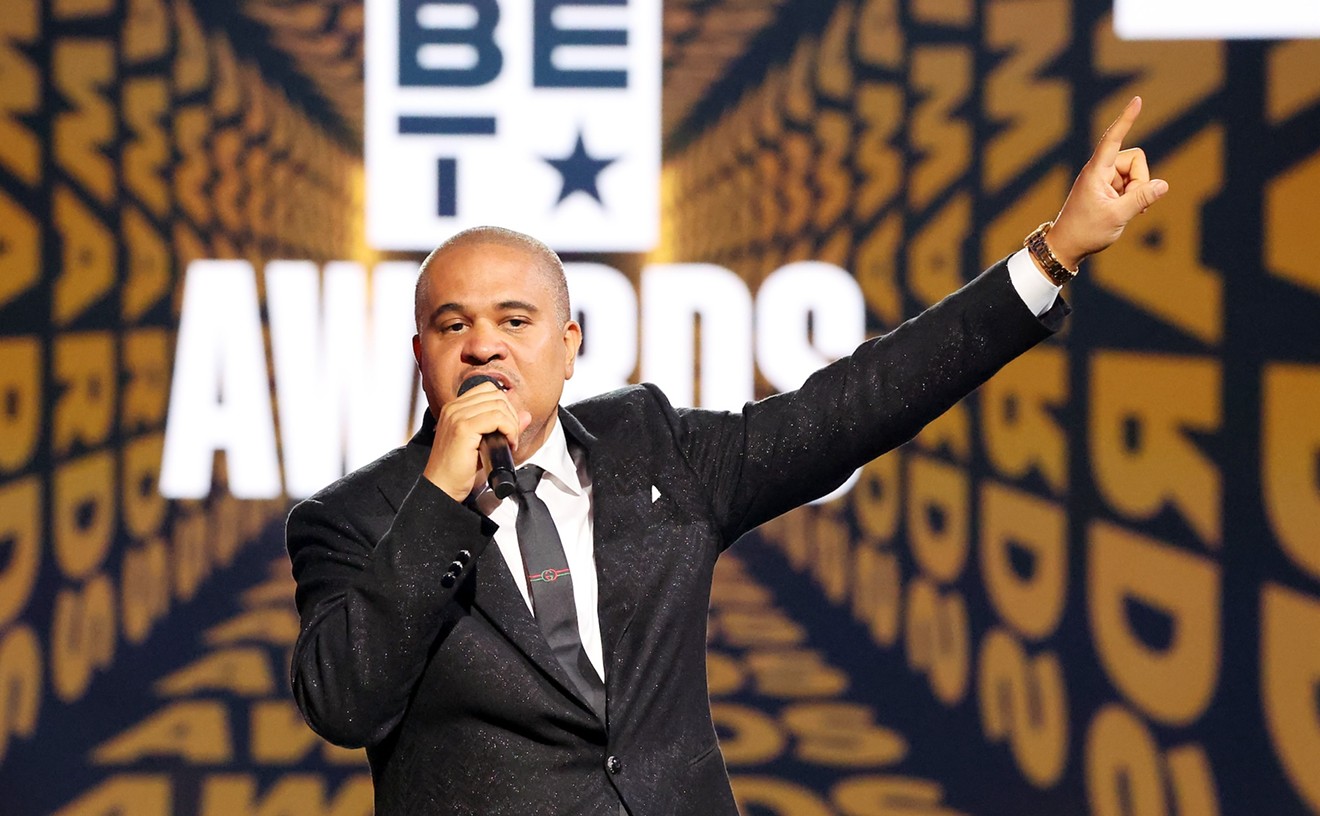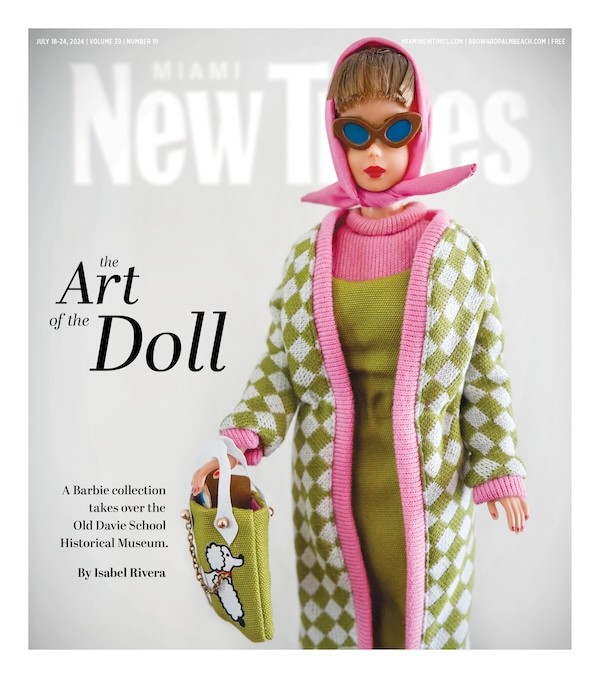Update: According to Kero Kero Bonito's publicist, the band's show at Gramps on Friday, November 15, has been canceled due to illness.
Gus Lobban can only speculate as to why his band seems to enjoy more popularity in the United States than in his home country of England.
"I think America is more engaged with new pop music and the thrill of the new when it comes to pop culture in general," Lobban says. "It has less hangups about authenticity and people's legacy or whatever."
Still, he admits it's difficult to pinpoint exactly why Americans have seemed to embrace the band's sound. Lobban is a multi-instrumentalist in Kero Kero Bonito, a London-based trio — also including vocalist Sarah Midori Perry and multi-instrumentalist Jamie Bulled — that synthesizes elements of bubblegum pop, J-pop, electro, and shoegaze to produce a syrupy confection of indie-pop gems.
The group rose to underground popularity while being lumped together with tongue-in-cheek British label PC Music. Although the band was never signed to the influential label, Lobban released a couple of tracks and remixes via PC Music under the name Kane West.
In 2015, PC Music seemed to finally grab the fascination of listeners and music critics alike thanks to acts such as A.G. Cook, Hannah Diamond, GFOTY, Easyfun, Danny L. Harle, and, most visible, Sophie, who wasn't signed to the label but collaborated heavily with artists in its collective. Fans quickly devoured anything the label and its associates released, and thanks to Lobban's affiliation, many listeners — particularly Americans — discovered his work with Kero Kero Bonito (KKB).
"I think there was no question that a lot of what was going on with [PC Music] was being informed by an American pop culture experience or approach," Lobban says. "There's also an element of Britishness being quite foreign and exotic to Americans. Not necessarily to compare us to the greats, but it's a bit like the Belleville Three who originated Detroit techno. People in America didn't really care about it at first apart from a very localized group, but they were having number one singles in the U.K."
Lobban rationalizes the phenomenon as KKB's music feeling like an escape to American listeners, while in the bandmates' home country they're simply kids making "weird music." America's size also factors heavily into the band's willingness to cross the Atlantic. An average U.K. tour consists of about five dates, but a North American one comprises around 35.
"We'll play shows in Cleveland or Lawrence, Kansas, that are bigger than the shows we play in Birmingham, [England]," he notes.
Before the band began bubbling up in America, Kero Kero Bonito started in 2011 with Lobban and Bulled releasing a few singles before searching for a singer on a message board for Japanese expatriates in London. After sifting through a load of odd responses, Perry, who is half-Japanese, piqued their interest thanks to a mutual interest in videogames and J-pop. As a trio, the band went on to release its debut mixtape, 2014's Intro Bonito. With skittering beats and melodies so fragile they seem to be held together by Scotch tape, Perry switches back and forth from English to Japanese while singing about mundanities such as parties, videogames, and homework.
The mixtape laid the groundwork for the band's proper debut, 2016's Bonito Generation, which kept KKB's signature kawaii style but added more complex melodies and pop hooks. The songs remained simple, with cuts such as "Trampoline" (about jumping on a trampoline) and "Break" (about taking a break) keeping with the band's unambiguous themes. However, KKB's sincerity became its most fascinating trait, quickly winning Lobban and crew a cult following. "I know it seems kinda tough/But really it's easy enough/For us to slow down the pace/So we can all go take a break," Perry sings earnestly on "Break."
So when the band dropped its second studio album, Time 'n' Place, last year, it arrived as a shock to many KKB fans. Instead of Perry's saccharine delivery atop electronic beats, the band delivered an indie rock album that leaned heavily into shoegaze backed by traditional instrumentation.
"I thought that KKB fans at that point would feel that we'd abandon them, and people that liked alternative rock already would think, This is a KKB record, so it's not for me," Lobban says. However, to the band's surprise, the opposite happened. Instead, the core group of fans seemed interested in following the band through its experimentation.
That warm reception also led the band to confidently overhaul its live show, which now includes the addition of a guitarist and drummer, giving KKB's older material a more pop-punk feel when played in a live setting. However, Lobban admits some songs were more difficult than others to rework into the new live show.
"A song like 'Trampoline,' that's a total electropop song," he says. "The beautiful thing about doing it is that I do think that any good song with a good tune you can arrange it and it will hold up. I think we were fortunate that we were working with material that had really pronounced melodies."
On its latest EP, Civilisation I, the band seems to have found a middle ground between its effervescent past and its more physical, instrumental-oriented present. Tracks such as "When the Fires Come" show off the group's growth through stronger melodies and more nuanced lyrical content.
"We weren't consciously going for a return of any kind, but I think we did feel like we want to play to our strengths when it came to electronic production," Lobban says. "It was just beautiful to be able to combine all these different musical lineages and techniques we've learned now and hopefully come up with something that's new and interesting."
Ultimately, Lobban says, the band just follows its gut; whether it'll lead back to KKB's earlier sound or take them in an entirely new direction remains to be seen.
"We'll keep following our gut — who knows where it's going to get us next."
Kero Kero Bonito. With Audrey Horny. 8 p.m. Friday, November 15, at Gramps, 176 NW 24th St., Miami; 305-699-2669; gramps.com. Tickets cost $18 via etix.com and $20 at the door.

Audio By Carbonatix
[
{
"name": "Air - MediumRectangle - Inline Content - Mobile Display Size",
"component": "19274298",
"insertPoint": "2",
"requiredCountToDisplay": "2",
"watchElement": ".fdn-content-body",
"astAdList": [
{
"adType": "rectangle",
"displayTargets": "mobile"
}
]
},{
"name": "Editor Picks",
"component": "17482312",
"insertPoint": "4",
"requiredCountToDisplay": "1",
"watchElement": ".fdn-content-body",
"astAdList": [
{
"adType": "rectangle",
"displayTargets": "desktop|tablet"
},{
"adType": "rectangle",
"displayTargets": "desktop|tablet|mobile"
}
]
},{
"name": "Inline Links",
"component": "18711090",
"insertPoint": "8th",
"startingPoint": 8,
"requiredCountToDisplay": "7",
"maxInsertions": 25
},{
"name": "Air - MediumRectangle - Combo - Inline Content",
"component": "17482310",
"insertPoint": "8th",
"startingPoint": 8,
"requiredCountToDisplay": "7",
"maxInsertions": 25,
"watchElement": ".fdn-content-body",
"astAdList": [
{
"adType": "rectangle",
"displayTargets": "desktop|tablet"
},{
"adType": "rectangle",
"displayTargets": "desktop|tablet|mobile"
}
]
},{
"name": "Inline Links",
"component": "18711090",
"insertPoint": "8th",
"startingPoint": 12,
"requiredCountToDisplay": "11",
"maxInsertions": 25
},{
"name": "Air - Leaderboard Tower - Combo - Inline Content",
"component": "17482313",
"insertPoint": "8th",
"startingPoint": 12,
"requiredCountToDisplay": "12",
"maxInsertions": 25,
"watchElement": ".fdn-content-body",
"astAdList": [
{
"adType": "leaderboardInlineContent",
"displayTargets": "desktop|tablet"
},{
"adType": "tower",
"displayTargets": "mobile"
}
]
}
]












